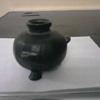Posted 11 years ago
 kehphones
kehphones
(53 items)
This was an unexpected EBay find. Usually I don't collect Millitary phones but this was priced right. When I received it I had no history or any information on it. Through "ATCA" club members; I got details of it. As well as what I found once I knew where it was manufactured. Most of the information on this phone is in German.
The phone name is a "Tischfernsprecher 38". It was used by the "Wehrmacht"; Armed Forces of Nazi Germany in 1939. (Date is on metal plate on back end of phone).
The phone was used as a "bunker" phone. Not a field phone. The battery box supplied a 1.5 to 3 volt charge to the carbon microphone. The microphone (element) has a "Swastika" below the eagle in red ink/paint.
If any of this information is incorrect please let me know so I can change it.
Thanks, Kurt


















The battery used was 1.5V only. These batteries are not made anymore as far as I know, but any battery of 1.5V is OK I use one AA battery on a similar phone.
An almost equal phone without the battery box was used as a bunker telephone. (As far as I have discovered the ringer (approx 350 ohms on OB38, and 1400 ohms at OB39) and handset was different and the bunker telephone was named OB39)
This OB38 was made as an officer's tabletop telephone a little more suitable than a field telephone on a desk. This could also be connected to CB sustems as in
N. America was known as CB signalling LB talking. It could also be used on a special magneto exchange with an automatic ring off signal.
The transmitter element for these telephones should have a green X, the transmitter pictured is a capsule made to be serviced (using special tools) instead of replaced when it became bad. (Modern replacements of the transmitter may demand higher voltage and a specific polarity of the battery.)
Some more info about this phone is available here: https://www.dropbox.com/s/nons1x1uvwdv783/Part%20II%20-%20German%20Line%20Communication%20equipment%20of%20WW2.pdf
from page 21. This is not mine so the link may die.
Thank you for all that information! When I was searching for information, all I came up with was stuff wrote in German. That web site worked for me.
Thanks again!
I am just a small scale collector. (just a few phones) But I love to learn about it, and repair and get things working. That makes me collecting information about telephone related stuff. Sometimes I repair phones for others too.
Things take time, but now I got my finger in to one, A bakelite holder for the generator handle was missing inside, and the ringer was missing, but I did put in a ringe from a field telephone FF33. It has higher dc resitance but works well as a ringer.
The phone is by theory made to work on CB systems too, still using the local battery so I guess it will be equal to US phones Like EE-8 And TA312 in CBS mode.
In pracsis it seems like it will not work as intended. I have been asking others having them in original condition and the ringer has to high restance to act as the holding coil.
My guess is that they did connect the 2 ringer coils in series (That is the usual way) but they should have been in paralel on this spesific phone. It would still work as a good German ringer from that era, and it would act as a holding coil.
If you still hve the phone it would be nice to know the resistance of the ringer. (leave the handset on and measure with an ohm meter between W1 and W2 )
dsk
Always learning something new, the ringer does not have to be different, but the looks like the connection terminals are sligtly different, only by text. On the OB 39 the battery terminals are stamped 4,5V . Then the transmittercapsule should be different too.. but I have not found much info about it. Green X on the transmittercapsules for 1,5V battery.
What I wrote 5 years ago about ringer resistance is actually wrong. I trusted some wartime documentation. The ringer has 2 x 700 ohms coils, but they are shunted, and the total resistance ends up with 350 ohms. That made it possible to give a stable off hook signal on an traditional POTS line.
The green X on the transmitter capsule indicates that 1.5V battery is the right one, and the connection box has room for a typical German 1.5V battery from that time.